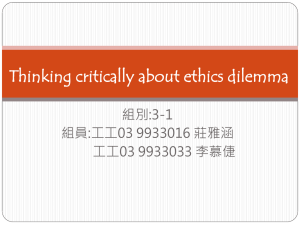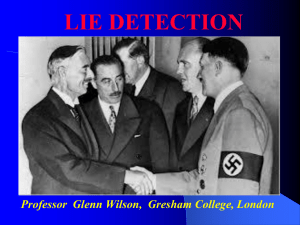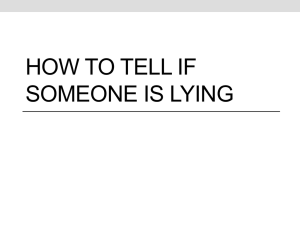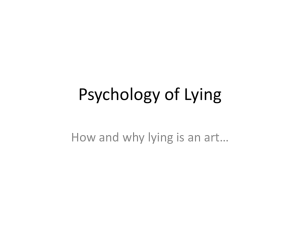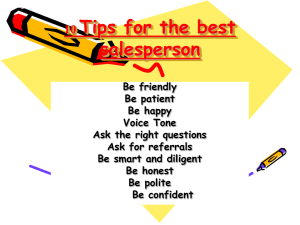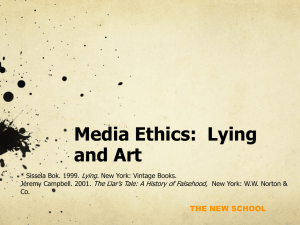Word - American Society of Exercise Physiologists
advertisement
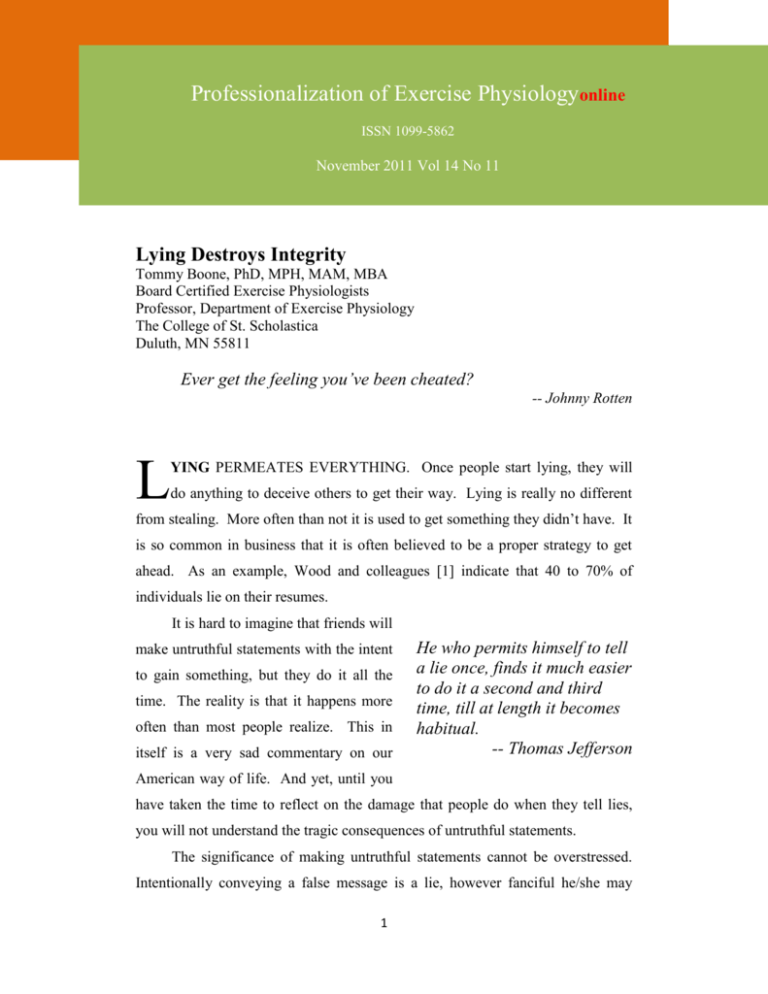
Professionalization of Exercise Physiologyonline ISSN 1099-5862 November 2011 Vol 14 No 11 Lying Destroys Integrity Tommy Boone, PhD, MPH, MAM, MBA Board Certified Exercise Physiologists Professor, Department of Exercise Physiology The College of St. Scholastica Duluth, MN 55811 Ever get the feeling you’ve been cheated? -- Johnny Rotten L YING PERMEATES EVERYTHING. Once people start lying, they will do anything to deceive others to get their way. Lying is really no different from stealing. More often than not it is used to get something they didn’t have. It is so common in business that it is often believed to be a proper strategy to get ahead. As an example, Wood and colleagues [1] indicate that 40 to 70% of individuals lie on their resumes. It is hard to imagine that friends will make untruthful statements with the intent to gain something, but they do it all the time. The reality is that it happens more often than most people realize. This in itself is a very sad commentary on our He who permits himself to tell a lie once, finds it much easier to do it a second and third time, till at length it becomes habitual. -- Thomas Jefferson American way of life. And yet, until you have taken the time to reflect on the damage that people do when they tell lies, you will not understand the tragic consequences of untruthful statements. The significance of making untruthful statements cannot be overstressed. Intentionally conveying a false message is a lie, however fanciful he/she may 1 want to think about it. Although believed to be quite apart from “real” problems, lying may be considered an illegal act when done in a business setting [1]. St. Augustine said, “…it is certain that every lie is a sin…” or “Thou shalt not bear false witness…” [Bible, Exodus 20:2-17]. In part, these statements are founded on the harm that lying causes. Seldom are liars concerned with the well-being of others. Regardless of the reason for lying, it is wrong. Lying is similar but worse than cheating on a test or taxes. Yet, clearly liars and cheaters are untrustworthy. Their behavior is unethical. Whether it is lying about a colleague or deceiving a spouse, it is still a lie. In fact, Adler [2] concluded that some 60% of workers felt more pressure now than five years ago to do Taking credit for others’ work in order to gain status isn’t leadership. It is unethical behavior and, it is fraud. something unethical or illegal. Remember, once they start lying, they are likely to do it again if given the chance [3]. Unethical behavior can be found in all work environments. Lying and back stabbing behaviors are so pervasive that those who do it don’t think twice about it. Instead, they blame others to justify their desires and/or weaknesses. Once colleagues are known to be dishonest, it is best to remember that they will lie again when it benefits them. In many ways, it is the same with athletes who cheat to win. They have actually convinced themselves that it is okay to win at all costs. Lies flourish in social uncertainty, when people no longer understand, or agree on, the rules governing their behavior toward one another. -- Paul Thaler The New York Times Magazine, 1991 Deception is at an all time high in the athletics and the workplace. Because deception and lying in business practices are commonplace, it is thought of as the right thing to do. But of course it is never right to deceive or cheat clients, friends, or anyone for that matter. This very point was discussed in an MBA course of which I was a student during the Fall Semester of 2009. Strangely, 2 many students (average age 35 years old) felt that honesty was not necessarily the best policy and that lying was an expected behavior in business. They believed that business is about all the bottom line. When push comes to shove, most people appear to think that honesty is not the best policy. Or, as Jensen and Meckling [4] said, “Everything, everyone, every value, and every situation has its price.” Lying has become automatic for many people [5]. As liars, regardless of the moral aspects of lying, they understand that lying “benefits the deceiver at the expense of the deceived” [6]. Knowing they are going to benefit, they deceive themselves into thinking their behavior is okay. But, of course, lying isn’t okay. It is deviant, deceptive, and unethical Considering the many forms of workplace abuse that exist, rudeness is at the low end of the workplace abuse ladder. This is because rudeness and incivility tend to fall short of forbidden behaviors such as discrimination and harassment. -- Suzanne M. Crampton and John W. Hodge behavior that is carried out to get one’s way. Fortunately, liars do get caught. Aside from denial, minimizing the lie [7], shame or guilt, some liars are fired when it becomes obvious that they lied to their clients and/or colleagues. Key Point. Lying makes things worse because it hurts your personal relationships: relationships with friends, brothers and sisters, parents and children, teachers and other adults. When you lie, it is a burden you have to carry with you. It makes you feel bad inside. You know you hurt your relationship with someone by lying. -- Girls and Boys Town http://www.girlsandboystown.org/aboutus/letters/archive/lying.asp Often times, liars internalize their lying to the point that they begin to believe the lie is true. This kind of self-deception eats away at the liars’ morality while helping to maintain a sense of inner calm. The downside is that liars know what they did, and they have to live with it for the rest of their lives. Liars work at 3 believing they are happy, but often deep inside the contradiction grows and spreads like cancer [8]. Most people would agree that a friendly work environment where employees are honest rather than dishonest is beneficial to everyone as well as the business itself. As Lee and McKenzie [9] said, “…businesses with credible employers, employees, and products are more profitable than businesses driven by lying and deception.” They believe that their reputation for honesty helps to convert potential customers into actual customers. To be blunt, people and businesses that cheat others are demonstrating behavior that is unjustified and unethical. Imagine this: It is just a matter of time that employees will be able to sue for rudeness and recover damages [10]. Lying in American is not an aberration or an occasional exercise. The culture of lying permeates life, from businesses engaged in dishonest practices to friends fabricating stories. Lying is a culture of disrespect and greed. Such behavior has a widespread effect on all aspects of life, including By a lie a man throws away and, as it were, annihilates his dignity as a man. -- Immanuel Kant Doctrine of Virtue the services of businesses and organizations. Strangely enough, this subject has received extraordinarily little attention and analysis. And yet, although truth-telling is important, it is often brushed aside for an easier path. Lying is definitely a form of deliberate assault on another person. A lie, in my father’s words is this: “Lying has the power to create immeasurable damage in the deceived person.” Such deception can be coercive [11]. It is unreasonable to think or to conclude that lying is justifiable. Under no circumstances is it right to conclude that the liar should be able to lie without impunity whenever he or she wants to do so. Lying, like criticizing, demeaning, or bullying a person, is often done because it gives the person a feeling of importance. Strange as it might sound, many people get a sense of 4 satisfaction out of lying. One hardly thinks about the motive, but it is usually insecurity, jealousy, and/or greed. Liars have no credibility. They are not people of truth and integrity. As St. Augustine said, “To use speech, then, for the purpose of deception, and not for its appointed end, is a sin.” Knowing this, it is believed as Kant [11] stated, a liar “diminishes himself by lying, and the loss is precisely to his dignity, his integrity.” Stated somewhat differently, Whatsoever a man soweth that shall he also reap. This means that whatever man sends out in word or deed, will return to him; what he gives, he will receive. -- Florence Scovel Shinn [15] a person without integrity is weak. But, keep in mind, that same person can also be dangerous. The latter thought is important to remember. To repeat, liars are dangerous! Ask anyone who has been knifed in the back or double-crossed, and that person will say: “I am still puzzled how my friend could do such a thing. You know it is not so much what he did, but how he did it.” It is truly a crazy thing how liars will misrepresent facts to gain something they want but haven’t earned. The good news is … the bad news can be turned into good news … when you change your attitude. -- Robert H. Schuller Their behavior is unethical and, therefore, such people do not get professionalism or a code of conduct (even though they may act as though they do). No wonder liars have difficulty with embracing organizations with a professional intent [12]. And yet, true professionals understand the need for ethics and commitment to standards and professionalism [13]. Such people do not lie, steal or deceive others for personal gain. If you find yourself in the presence of a person (or people) who has (have) lied about you, do not cling to the circumstances. Do what you can to forgive and, then move beyond the circumstances. Otherwise, as Joan Chittister [14] said, “If we cling to the past, the future is closed to us.” Understandably, human beings need friends and a future. They need people they can trust, and they need to have 5 a sense of their destiny. When friends betray each other, someone always is hurt. Emotions run high and, frankly, the hurt does not heal easily. A beginning step to turning things around is forgiveness. But, as Lewis Smedes [16] said, “When we forgive someone, we do not forget the hurtful act…” Even the liar understands this thinking, and he/she shares with those they deceive the desire not to be deceived [17]. Interestingly enough, though, they even insist on honesty from others. Honesty is part of one’s moral character. It denotes integrity and truthfulness, both of which are the opposite of lying and cheating. By a lie a man throws away and, as it were, annihilates his dignity as a man. -- Immanuel Kant Doctrine of Virtue So how does a person deal with liars? One method that has worked is journaling or simply writing about what happened. The process is very much like prayer. Individuals are attracted to it because it attracts them to find peace of mind, which is similar to Benedict says that the spiritual life is not simply what we think about; it is what we do because of what we think [14]. praying. The meaning of writing is not so much its content (although important) as in its emotional expression. The fact is this: the human dimension of what it means to be human requires all forms of expression (physical, emotional, and mental). Thus, whether it is writing or praying, the person looks for something. It is the kind of assurance that he or she is worthy of continuing to breathe the air that everyone enjoys. There are some who would read this brief article in an exercise physiology professionalism journal and be surprised of its discourse. The purpose is twofold: First, it is for those who have changed their lives on the backs of others to cause them to reflect on the hurt they have done. To not take the time to consider the effects of their behavior is pathetically mundane if not self-destructive. Perhaps, this is the right time to mention that cutting corners on protocol is never good or correct. 6 Second, the problem is that liars need help and yet they would say: “It’s your problem. I don’t have a problem.” At worst they should seek the solace of others to deal with the stress and misguided sense of Do not lie to one another…. -- Colossians 3:5-10 doing the wrong thing. Like change, the spiritual side of wrong doers requires processing facts and feelings, not an event. Coming to terms with the evil of lying isn’t easy. In time, the misdeeds become clear but often the “forgiving” is next to impossible. Above all, it is common knowledge that eventually the “what was done” and “how it was done” become obvious to the liars and to everyone else who ultimately live with the shame of lying. But, while this is true, it doesn’t square things up. These Are The Questions? Has your friend lied about you and won’t own up? Does your friend look awkward whenever your paths cross? Getting a person to own up to a lie isn’t easy. The best a person can do is to show a little empathy and, if possible, a path of least pain for the liar to save face. If only everyone involved in lying could understand just for a moment the pain they cause, maybe they would think 40 times before lying. Maybe, those who have been hurt at such a deep level could say, “we forgive you.” Just maybe, they could forgive them for every dirty thing they said and did. The truth is, Steve said, “I wish it were otherwise, but being human and subject to 1000s of things less than perfect, I can’t just forgive the guy who was driving drunk and killed my friend. I have tried and, yes, it eats at me.” Edna Hong [18] said, “Death is indeed a cure for the diseases of the flesh, but it cannot heal or rescue that which flesh has housed in this mortal life – the spirit.” This is an interesting statement. While there are many dimensions to it, please appreciate that the living are not dead. Families who are hurting are not dead. They are living the liars’ greed and oppression. Their emotions, financial factors, and passions are all adversely affected. And yet, strangely enough, the liars are indifferent to the misrepresentations of their comments and the effects on others. 7 Here’s the deal. Admittedly, liars hurt other human beings. At the most fundamental level all that can be done is to forgive even though it is hard if not impossible to do. Forgive and forget, although the latter isn’t always easy to do. In light of the title of this article, “Lying Destroys Integrity,” it is best to forgive the liars for destroying their own dignity. Yes, however, hard it is, just put it behind you and get on with life. After all, they aren’t worth the time wasted thinking about them. The Eight Commandment, “Thou shalt not bear false witness against they neighbor,” is extremely important for the welfare of society. Why not take a moment to think about “why” the Commandment is so important. First, it forbids false testimony that is known to be untrue. Second, it forbids pronouncing one guilty without having heard his defense. Third, it forbids injury to a person’s character by engaging a malicious lie. “Lying lips are an abomination to the Lord” (Prov.12,22). Fourth, it forbids imputing faults to others unduly, exaggerating real faults and defects, or denying their good qualities or actions. Fifth, making known the secret faults of another without just cause. It is commonly done by imparting uncharitable gossip. “Thou shalt not be a detractor nor a whisperer among the people” (Lev, 19, 16). For more information on this topic, refer to This Is The Faith, a Catholic Theology For Laymen [19]. 8 References 1. Wood, J. L., Schmidtke, J. M., and Decker, D. L. (2007). Lying on Job Applications: The Effects of Job Relevance, Commission, and Human Resource Management Experience. Journal of Business Psychology. 22:1-9 2. Adler, R. S. (2007). Negotiating with Liars. MIT Sloan Management Reviews. 48:4:69-74. 3. Lindner, M. (2008). How to Tell if Someone is Lying to You. Forbes. [Online]. http://www.msnbc.msn.com/id/24038022/print/1/displaymode/1098/ 4. Jensen, M. and Meckling, W. (1994). The Nature of Man. The Journal of Applied Corporate Finance. 7:4-19. 5. Darnton, N. (1989). Understanding Kids’ Lies. Newsweek, U.S. Edition, October 2:62. 6. Crawford, V. P. (2003). Lying for Strategic Advantage: Rational and Boundedly Rational Misrepresentation of Intentions. The American Economic Review. 93:1:133-149 7. Aquino, K. and Becker, T. E. (2005). Lying in Negotiations: How Individual and Situational Factors Influence the Use of Neutralization Strategies. Journal of Organizational Behavior. 26:661-678. 8. Hsieh, D. M. (2004). False Excuses: Honesty, Wrongdoing, and Moral Growth. The Journal of Value Inquiry. 38:171-185. 9. Lee, D. R. and McKenzie, R. B. (1995). How the Marketplace Fosters Business Honesty. Business and Society Review. 92, Winter, 5-9. 10. Kranz, G. (2007). Employees: Let Us Sue Workplace Bullies. Workforce Management. [Online]. http://www.workforce.com/section/quick_takes/48389.html 11. Bok, S. (1978). Moral Choice in Public and Private Life. New York, NY: Vintage Books. 12. Fitzpatrick, M. L. (1983). Prologue to Professionalism. Bowie, MD: Robert J. Bradley Company. 13. Keer, S. and Jermier, J. M. (1978). Substitutes for Leadership: Their Meaning and Measurement. Organizational Behavior and Human Performance. 22:375-403. 14. Chittister, J. (1992). The Rule of Benedict. New York, NY: The Crossroads Publishing House. 15. Shinn, F. S. (1925). The Game of Life and How To Play It. Marina del Rey, CA: DeVorss & Company, Publisher. 9 16. Smedes, L. B. (1984). Forgive & Forget: Healing The Hurts We Don’t Deserve. New York, NY: Pocket Books. 17. Bok, S. (1978). Lying: Moral Choice in Public and Private Life. New York, NY: Vintage Books. 18. Hong, E. (1984). Forgiveness Is A Work As Well As A Grace. Minneapolis, MN: Augsburg Publishing House. 19. Ripley, F. J. (1951). This Is The Faith. St. Paul, MN: Catechetical Guild Educational Society. 10
